8. Farmers fighting the climate crisis in Bangladesh
Peasants and other people working in rural areas have the right to contribute to the design and implementation of national and local climate change adaptation and mitigation policies, including through the use of practices and traditional knowledge”.
As a geographically low-lying country, Bangladesh is on the frontlines of the climate crisis; yet poverty, underdevelopment, and neocolonial policies are hindering the country’s ability to mitigate and adapt to the effects of increasing climate breakdown.
Agriculture is a major sector of Bangladesh’s economy, representing 13% of GDP in 2018. It is dominated by smallholders with farms of less than an acre (0,4 hectares), effectively landless peasants. Rice is the main crop grown across the country, concentrated in lowland and coastal areas, with fish the secondary major food export.
Bangladesh’s coastal areas are already experiencing increased soil salinity due to climate breakdown-induced rising sea levels. This is made worse by flash flooding which leaves soil waterlogged with sea water, literally salting the earth and making it completely unsuitable for growing crops.119
Along the coastal region of Bhola and the fishing port of Cox’s Bazar, fisherfolk face frequent cyclonic storms and high waves, causing damage and destruction to fishing vessels and nets, and meaning fishing excursions have to be abandoned.
Cox’s Bazar is often beleaguered by flash floods and waterlogging, making aquaculture (fish farming) difficult to impossible. And in Bhola, river erosion is forcing changes to livelihoods and migration to cities. Other areas across Bangladesh face extreme drought. The FAO predicts that Bangladesh’s development achievements over the last 30 years are now likely to slowly regress.
We had about five and a half hectares of land in one plot. 24 hectares in another plot. Quite a lot, really. All of it disappeared into the river. We had to move our house and now we are forced to do odd jobs"
We had lots of lands there, our own household, abundance of trees and other wealth. Then in 2003, everything has gone into the river. Nothing is left now”.
Global South countries such as Bangladesh are the least responsible for the climate crisis in terms of contribution to all-time carbon emissions, yet are paying the heaviest price for climate breakdown.
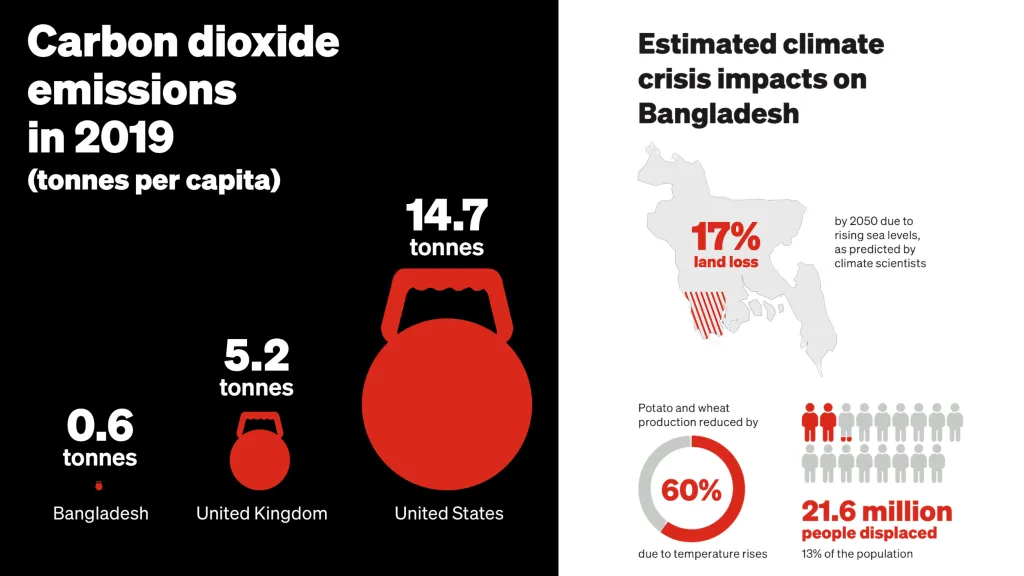
Farmer movements are fighting back by applying local knowledge and climate-adaptive agriculture and mitigation approaches to crop cultivation.
Adaptation and Mitigation techniques:
Vegetable bags: one technique is to cultivate vegetables in sacks, rather than directly on the soil. This keeps vegetable roots out of the soil. For instance, sweet pumpkin, rice pumpkin, bitter gourd, okra, red spinach and other creeping vegetables can all be grown in vegetable bags, which protect crops from flooding.
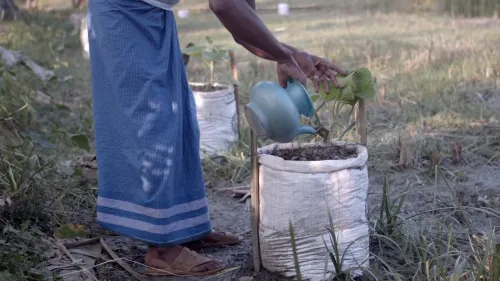
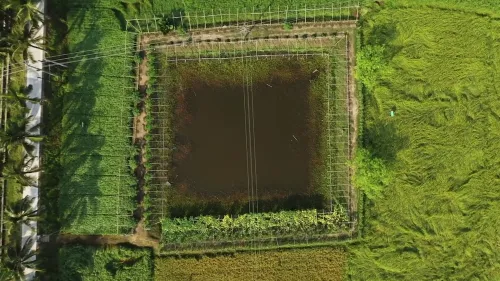
Integrated cultivation of fish, fruits and vegetables: in coastal areas, farmers are making use of traditional pond cultivation techniques to grow vegetables alongside farming fish. Pond embankments are elevated so that tidal water cannot enter. Creeping vegetables are grown on the inner banks, outer banks are lined with fruit trees, and various vegetables are planted in the middle.
Bed-Based Vegetable Cultivation: farmers are solving irrigation and flooding issues by planting vegetables in raised beds – which naturally collect and retain fresh water. Raised-bed farming makes it possible to grow crops in the dry season.
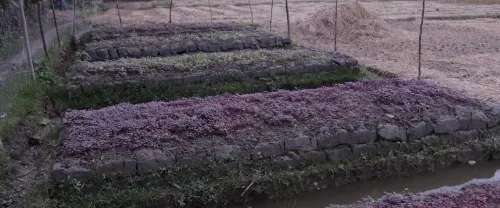
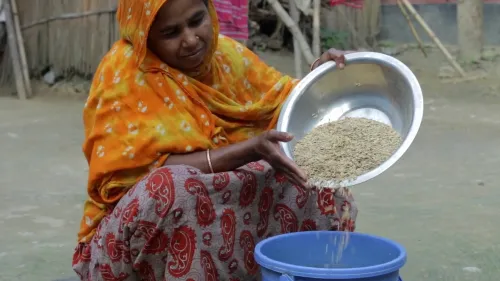
Maria Seed Technology Model: Village farmers, mostly women, preserve seeds for the following year’s paddy cultivation using a technique called the ‘Maria Seed Technology Model’. Farmers slowly mix a kilogram of salt with 4-5 litres of water in a tub, and add an egg, with the mixing process continued until the egg floats. Seeds are then added into the mixture; if they float, they are considered low-quality and are rejected. The seeds which sink to the bottom are selected as ready for preservation.
The Bangladesh Agriculture Farm Labour Federation (BAFLF) and Jatiyo Kisani Shramik Society (JKSS), which translates as the National Women Farmers & Workers Association, are working to create an environmentally and socially sustainable, resilient, and egalitarian food system. To this end, both organisations advocate for increased social protections, gender equality, and safe employment, and for the right to food, health, housing, and land. As the national trade union federation for the agricultural sector, BAFLF works to protect and promote the rights and interests of smallholder and marginal farmers and agricultural workers. In 2022, BAFLF has been campaigning for fair wages, employment guarantees, crop subsidies, farmers’ rights to land, seeds, and other natural resources; and livelihood assistance for farmers and farm workers affected by the climate crisis.
BAFLF is a strong advocate of food sovereignty, and opposes the corporate globalisation of agriculture, including land grabbing and the introduction of genetically modified organisms (GMOs) into Bangladesh.121
JKSS works mainly with women farmers and farmworkers to hold workshops, education programmes, trainings and demonstrations. JKSS advocates intensively for the reduction of pesticide use, the problems with GMOs and foreign seeds not adapted to the local context; and for alternatives to the dominant industrial agricultural model, such as the use of local seed varieties. JKSS fights for climate justice, food sovereignty and agroecology to protect the rights and livelihoods of agricultural workers and farmers; through a range of workshops and training sessions to encourage local seed use and preservation, non-pesticide-based farming technologies, and organic poultry and fish farming in coastal areas.
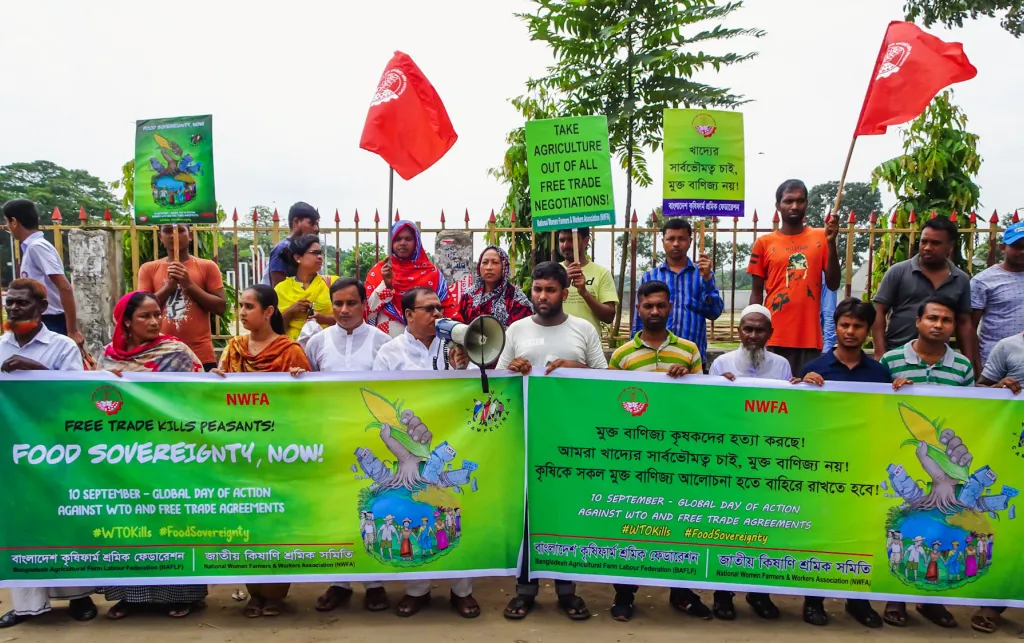
In February 2019, BAFLF, JKSS and allied groups organised a two-month campaign to fight the commercial release of a new, genetically modified form of rice called ‘golden rice’.122
The Stop the Golden Rice Campaign has been one of the longest-lasting campaigns of BAFLF and JKSS in the country. This campaign was partly organised by BAFLF members who worked at the Bangladesh Rice Research Institute (BRRI), a national research institute funded by international corporations investing in biotechnologies and developing golden rice. BAFLF and JKSS lobbied the Ministry of Agriculture and the International Rice Research Institute (IRRI) – urging them to stop the commercial release of golden rice, and organised a national agricultural workers’ convention to create mass awareness. After a series of protests by the movements and popular pressure, the campaign managed to put a temporary halt to the approval of this crop.
Whilst farmers in Bangladesh are facing colossal destruction to their land because of climate breakdown, countries in the Global North which have contributed the most to the climate crisis are neglecting their obligations to provide sufficient funding and resources – to compensate for the loss and damage caused to countries such as Bangladesh.
It is being left to farmer associations, unions and networks like BAFLF and JKSS to innovate in order to adapt to and mitigate against the onslaught of floods and other extreme weather events, caused largely by the Global North.
